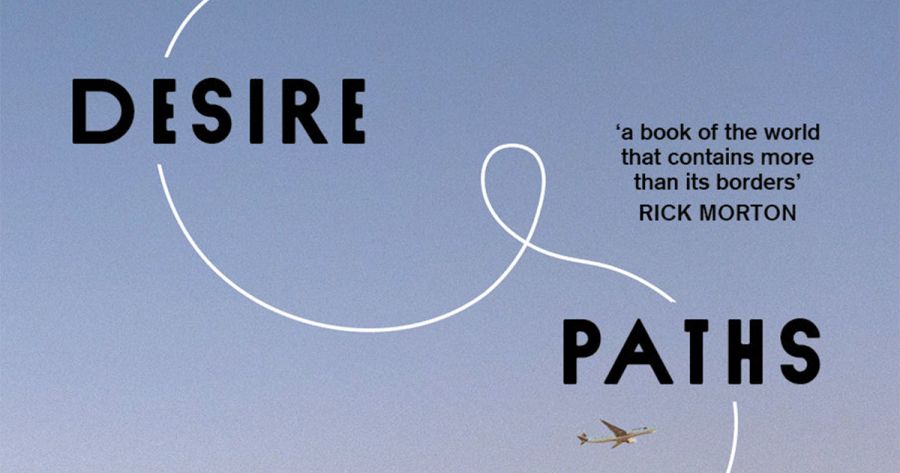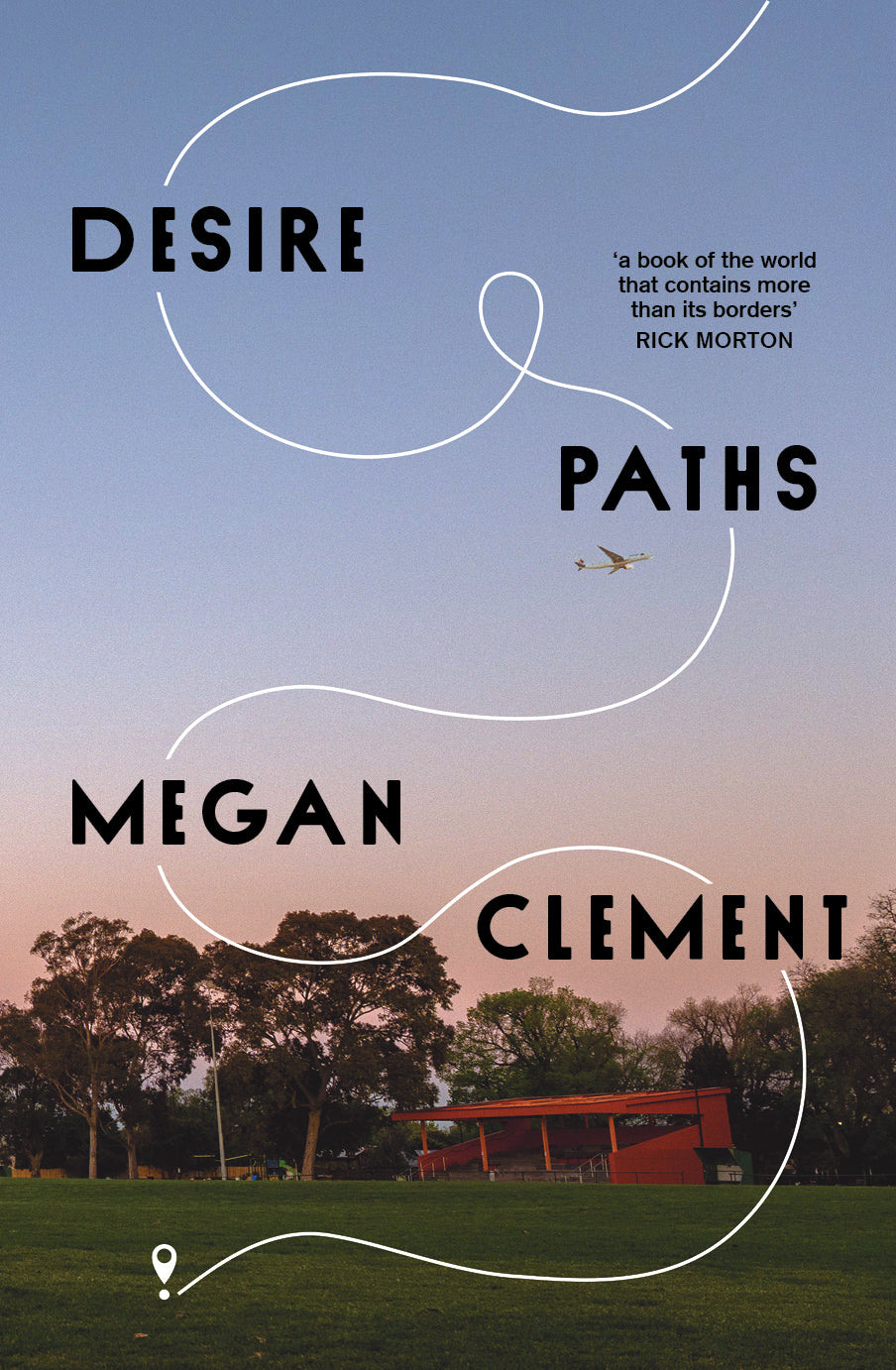
- Free Article: No
- Contents Category: Memoir
- Review Article: Yes
- Article Title: Jar labelled ‘Australia’
- Article Subtitle: A memoir of worldly movement
- Online Only: No
- Custom Highlight Text:
Urban planners refer to the accidental trails created by foot traffic as ‘desire paths’. These are the unintentional routes shaped by the footprints of where humans wish to go, rather than the signposted pathway. They are the barely-there tracks, sometimes right next to the concreted or cobblestone walkway, in quiet defiance of dictated procession. It is a concept ripe for writerly annexation – author Robert Macfarlane calls them ‘free-will ways’ – which journalist Megan Clement does superbly in this memoir of her beloved father’s death told through the desire paths her own life has taken – from a childhood in Stoke-on-Trent, in England, and Zimbabwe to her teenage years growing up in a leftist, working-class enclave of Melbourne and the years she spent flying between France and her dying father in Australia, until the pandemic grounded her in Melbourne, sans fresh air, human contact, and any possibility of carving out fresh footfall.
- Book 1 Title: Desire Paths
- Book 1 Biblio: Ultimo, $36.99 pb, 305 pp
- Book 1 Cover Small (400 x 600):

- Book 1 Cover (800 x 1200):

- Book 1 Readings Link: https://www.readings.com.au/product/9781761153358/desire-paths--megan-clement--2025--9781761153358#rac:jokjjzr6ly9m
Clement is aware that hers is a personality utterly shaped by where she has lived and what drove her there: journalistic ambition in many cases, but also curiosity and a keen sense of social justice. ‘To walk around a place, knowing no one, feeling bewildered by difference and shaken by the misfortune of others around you, is to begin to forge a new version of yourself,’ she writes. Yet, to routinely change address is to also wonder where you truly belong. ‘To leave a home to make another one elsewhere is to ask yourself, for the rest of your life: What have I done?’ Clement notes.
She takes aim at the false typologies of how we classifymigrants, with Black and brown people labouring under the nomenclature of ‘immigrant’, while white people luxuriously self-identify as ‘ex-pats’. Leaving the antipodes, Clements argues, is treated by suspicion among those who stay, a temporary blip before the Australian passport asserts its primacy. Clement describes this kind of thinking: ‘She’s going out there to get some experience of the world, but she will be back eventually for superannuation and proper beaches, decent coffee, white wine in the sun, democracy sausages.’ Migrants, especially, must be grateful for their new homeland and acknowledge the superiority of Australia over their birthplace. To leave or snark is to be ungrateful.
Perhaps inevitably, Clement is pinioned by Fortress Australia. She flies back to Melbourne from Paris to visit her ailing father in 2020, but travels no farther than the Holiday Inn at Tullamarine, for her mandatory two-week isolation. Here Clement is exposed to the shambolic Victorian hotel quarantine program: security guards without correct Personal Protective Equipment (PPE), a lack of hierarchy among authorised officers, and poorly disinfected spaces. Clement must wheedle her way to a compassionate exemption so she can see her dying father, a feat she manages on an impressive number of occasions. In desperation, Clement starts a Twitter thread from her confines, highlighting the grievous state of hotel quarantine, which goes viral.
At the time, she tells herself that her protestations are not about her but about those without a voice, but she wonders if this is entirely true. The fact is, she is worried about herself, as well: that she will catch Covid-19 or go mad from a lack of fresh air. She is worried, most of all, that she will not see her father before he passes. Some pundits on social media find her fault-finding treasonous, and Clement can’t help but think of Australia as ‘a nation not afflicted by the tyranny of distance but sinking into the luxury of it’.
The structure of the book and the force of Clement’s prose gives her memoir a certain charge. Her writing is stylish, sophisticated, and earnest in parts, but also warm and wry. She has a comic’s astute timing and a sharp tongue. Clement is self- deprecating about her undergraduate leanings, her propensity in her university years for difficult student-exchange destinations rather than easy European cities. When she walks her parents’ Labrador through a newly gentrified Melbourne suburb, one fellow walker glances at her muddy boots and declares: ‘Oh, you’re the daughter who lives in Paris. I might have known. We don’t wear shoes like that around here.’ ‘Fuck you, lady,’ Clement thinks. ‘My boots and I were here before the toasties.’
Clement’s writing is less convincing when she singles out the myopic politics of Australia – chiefly, our refusal to parse our colonial past – as if we are unique in this wilful historical amnesia. To be fair, Clement notes the rise of the far-right in her adopted home of France and the distrust of migrants, but then waves that away, noting that living in Paris ‘suits her fine’. Then something extraordinary happens, as Clement inches toward a truth that, one suspects, has been crouching in the corner of her mind all along: one of the reasons she cannot live in Australia is because it was where she was sexually assaulted. It is far from the only reason she doesn’t call Australia home – Clement is too complex a thinker to ascribe trauma to every life decision – but it has played its role. After she is assaulted, she does not sleep through the night; it takes leaving Australia for her to sleep properly again. ‘When I left Melbourne in 2013, I had, without realising it, placed my fear into a jar labelled “Australia” and screwed it tightly closed.’
Clement has managed a multi-layered memoir ostensibly about her father’s death, while asking broader questions about the landscapes and events that shape us. My own father died while I was reading Clement’s memoir – also of cancer, also a long-time-coming – and as I read about her many border crossings, an awareness grew of another kind of desire path, the one that loops back on itself and lands in the same place as where we began, a sort of homecoming.


Comments powered by CComment